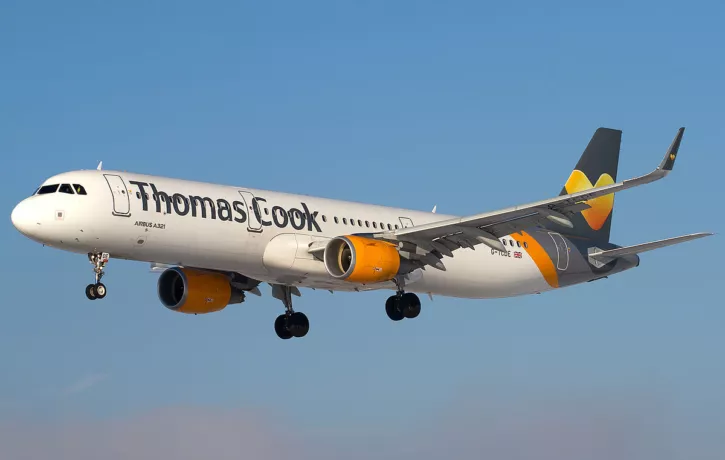After nearly 180 years of stable success, the global travel agency Thomas Cook, which straggled behind e-commerce competition finally collapsed last week, leading to the immediate liquidation of the company and the stranding of 150,000 travelers around the world.
What led to the company’s dramatic end, and what can all business leaders learn from it?
Early successes were enough to keep Thomas Cook afloat — until they weren’t

Thomas Cook opened his small company in 1841 in Leicestershire, England. Over the following decades, he expanded his business model, and as modes of transportation developed, so did his global reach.
Eventually, the small but ambitious travel agency built a sturdy reputation for itself. But competition was fierce and the company had to find its niche to succeed. In 1855, the leadership caught wind of a new tourism service: the travel package.
Although they did not invent the idea, Thomas Cook quickly improved the existing version, adding charter flights, hotels, and meals for their customers.
Imagine how luxurious it must have felt for middle-class customers at that time to walk into a quaint little store-front office and book an all-inclusive vacation.
The personnel were exceedingly warm and helpful, the destinations were exotic, and best of all, the prices were affordable. The business steadily grew, and soon they had brilliantly branded their delectable tourism-industry gem with the slogan: “Don’t just book it, Thomas Cook it!”
Sadly, we all know that the story of Thomas Cook does not end well. Just last week, the corporate giant that was once a household name, was devoured by its own debt and a modernized industry that it failed to keep pace with.
Dive Deeper: Digital Strategy Amid Rapid Growth
How could a company that boasted 178 years of success be brought so swiftly to its knees?
In the Digital Era, you can die, survive, or thrive
The bankruptcy of Thomas Cook tells the foreboding story of what happens when a customer experience-focused business grossly underestimates the shift in consumer demand. They weren’t the first and they won’t be the last company to collapse in the face of change.
What sets apart those that die, those that survive, and those that thrive?
Products and services that are in high demand are born out of necessity. But when the needs of the consumers change, companies in any given industry have to be ready to change with them.
There were two distinct but connected fatal mistakes that Thomas Cook made as digitalization swept their industry into a frenzy of new opportunities.
Mistake No. 1: Sitting out of the digital race
The company’s first mistake was to underestimate the need to go online. They insisted on maintaining storefronts that ran high operating costs. Bookings still relied on phone conversations with their agents.
The efficiency, speed, and ease of online competitors were simply incomparable. And no amount of old-fashioned charm could beat that.
Mistake No. 2: Putting tradition before progress
The second mistake was to ignore the need to pivot their product all-together.
Thomas Cook’s prime product was their all-inclusive travel packages, but the internet and transparent access to flight and hotel bookings have made customizable travel planning so easy. Eventually, the concept of a pre-arranged package began to sound less convenient and less personalized to the average e-commerce consumer.
Businesses in the tourism industry have needed to discover and invent new strategies to retain their value to travelers. Expedia, Priceline, and even newbies like Airbnb dominate the industry and have blown brick-and-mortar companies out of the water.
Some are pointing their fingers at the tourism industry as the reason for this colossal downfall. But each industry faces its own unique challenges as technology advances, and it would be amiss to blame industry itself for any individual company’s failure. In fact, the travel industry is the second-fastest-growing sector in the world.
How to be a “thriver” and not just a survivor

No company — no matter what industry it is in, and no matter how big it might be — is immune to failure. The age of digital transformation has been a trialing time for many organizations ranging from all industries. Those that keep innovation and agility as core values are poised to embrace change and evolve alongside customer demands.
Industries don’t die, they evolve. It is the companies within tumultuously evolving industries that keep pace or rest in peace.
Thrivers prioritize innovation, encourage and support their employees, and know that technology is a powerful and precious tool. They keep a constant pulse on consumer market changes and consistently gather and utilize insights to ensure that they are hitting the mark.
E-commerce tourism competitors were able to amass invaluable data in just a few years that Thomas Cook could not have gathered in its nearly 18 decades of existence.
Thrivers are daring, take bold risks, and embrace technological advancement as an opportunity to pivot in their objective, messaging, or even product itself.
If we’ve learned anything from the downfall of Thomas Cook, it’s that surviving amid a rapidly changing industry requires a willingness to approach challenges with agility, flexibility, and resilience. But thriving requires forging new paths and becoming industry leaders by utilizing the wide-open doors of digitalization.
Above all, learn to ride the tide of change into the future, because those that cling to the past will end there.


